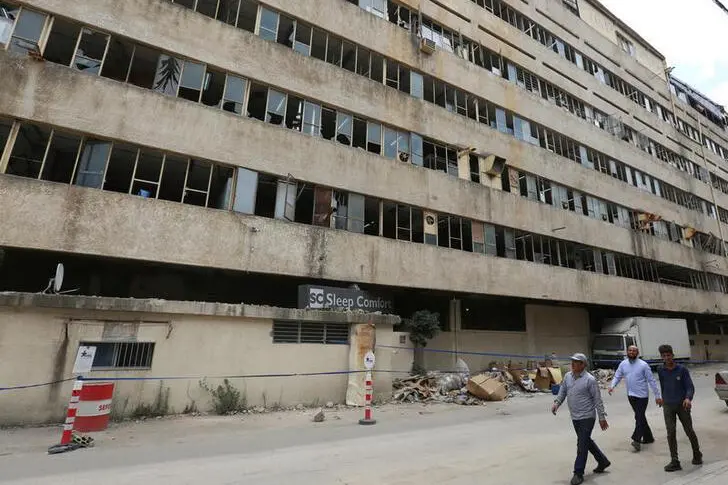PHOTO
Until almost a decade ago, the Arab world had remained largely resistant to socio-economic crises. But the self-immolation of a Tunisian street trader unleashed a tidal wave fueled by unbridled optimism for change across the region.
At its heart was a simple yearning for new social contracts that centered on the average citizens’ needs and interests, as opposed to the usual deference to those of the political or economic elites. As simple as it was, that desire resonated across borders, ethnicities, religious affiliations, political alignments and social classes.
Years later, the result leaves much to be desired but the seeds were planted, and with the speed at which information flows from one part of the world to another, a new reality is emerging. The Arab world can longer afford to turn a blind eye to individual countries' social, political and economic woes, lest it spread and plunge the region into a chaos far worse than the events in 2011.
Yet, here we are again.
In Algeria, Tunisia, Egypt, Sudan, Jordan, Iraq, Lebanon and the Gaza Strip there is dissent, civil disobedience and protests, even amid a pandemic. Evidently, significant swaths of the Arab world's population are deeply dissatisfied with what seems to be a return to previous problems, or worse. The so-called “Arab Spring” had promised much in the way of economic opportunity and greater individual liberties, restoring decades of lost dignity. The circumstances that provoked the events of 2011 remain present in 2020 and may continue to plague the region for years.
Worse, as the pandemic decimates fragile economic sectors still recovering from a decade of instability and uncertainty, many more people will brave crackdowns and illness to make their voices heard. After all, there is little else left to lose given the despair of rising poverty, joblessness, oppression and diminishing prospects.
What happens next is anyone’s guess, and absolutist declarations about the region’s future would be intellectually dishonest. However, the power to lead, not rule, is granted by consent of the governed, not by attacking an enraged public. The repressive steps taken by some governments grappling with protest movements do more harm than good, with all too familiar outcomes. In seeking power, the ruling elite only sow the seeds of their eventual removal. In silencing dissent, they only encourage defiance and persuade the silent neutrals, the moderate middle, to join in.
This mostly neutral force is important because it traditionally prefers the quiet sidelines where life was neither wholly comfortable nor wholly unbearable. After all, most developments tend to be defined by the running battles between minority groups on opposite extremes of the religious, social, political and economic spectrums.
This splendid isolation of the moderate middle thrives in periods of political stalemate and is perhaps why the Arab Spring sputtered before achieving its democratic ideals. Inspirational as they may be, protest movements are unlikely to extract any meaningful commitments to change from regimes, let alone depose them, as long as these neutral voices remain silent.
For example, protests have raged in Lebanon for the past decade, but none had any material impact other than to incentivize more power-grabs. However, the Beirut port explosion was the consequence of an incompetent, disinterested and callous government, and has enraged even the moderates who are now active participants in a growing anti-government movement.
Once again, an Arab nation is in the midst of a storm that will usher in a period of change. It is too soon to tell whether that change will be for better or worse. If growing conversations about revisiting the 1989 Taif Accord and even the 1943 constitution are anything to go by, the Lebanon that will emerge is likely to be very different from what it has been since the civil war ended.
For the rest of the region, events in Lebanon may just pass as more of the same in the Levant, an area that is no stranger to social and political upheaval. However, a successful protest movement and self-rescue from the brink of collapse will inspire other movements in the region looking to achieve that same sort of success. It portends even more uprisings and will embolden opposition figures faced with crackdowns and heavy-handed repression under the guise of enforcing restrictions to control the pandemic.
On the other hand, should violent conflict break out, , the resulting displacement and exodus of Lebanese and Syrian refugees could trigger negative reactions or even humanitarian crises.
Additionally, in Syria, Libya and Yemen there is fire under the ashes that can light and spread in the region and beyond. The region cannot risk another geopolitical quagmire, which countries like Russia will more than relish as an opportunity to take on the role traditionally filled by the US.
If Lebanon is to have a chance at all, the region and the rest of the world cannot stay aloof as the situation deteriorates. It remains unclear what the protest movement in Lebanon envisages as an acceptable alternative to the current woeful leadership and ruling elite. Given the potential ramifications of what is already transpiring in Lebanon for the rest of the region, it is critical that the Arab world continue to pay attention there or risk a far worse version of 2011.
- Hafed Al-Ghwell is a non-resident senior fellow with the Foreign Policy Institute at the John Hopkins University School of Advanced International Studies. He is also senior adviser at the international economic consultancy Maxwell Stamp and at the geopolitical risk advisory firm Oxford Analytica, a member of the Strategic Advisory Solutions International Group in Washington DC and a former adviser to the board of the World Bank Group. Twitter: @HafedAlGhwell
Copyright: Arab News © 2020 All rights reserved. Provided by SyndiGate Media Inc. (Syndigate.info).





















